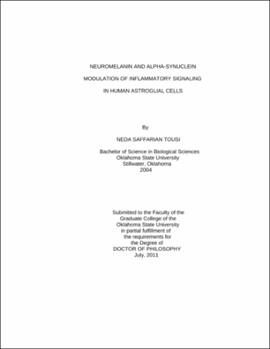| dc.contributor.advisor | Davis, Randall L. | |
| dc.contributor.author | Saffarian Tousi, Neda | |
| dc.date.accessioned | 2013-11-26T08:22:58Z | |
| dc.date.available | 2013-11-26T08:22:58Z | |
| dc.date.issued | 2011-07 | |
| dc.identifier.uri | https://hdl.handle.net/11244/6674 | |
| dc.description.abstract | Scope and Method of Study: The scope of this dissertation was to study the effects of two Parkinson's disease associated molecules, neuromelanin and a-synuclein, on inflammatory signaling and expression in A172 astroglial cells in vitro. Real-time PCR and ELISA were used to measure changes in CXCL10 mRNA and protein expression, respectively, and the Griess reagent was used to measure nitrite accumulation as an index of iNOS expression. NF-kB activation was examined using ELISA-based transcription factor assays. | |
| dc.description.abstract | Findings and Conclusions: The findings from the current study concluded a cytokine-dependent regulation of astroglial CXCL10 and iNOS expression by a-synuclein and neuromelanin. Alphasynuclein induced the expression of CXCL10 in both IL-1B- and TNFa-stimulated astroglial cells, however, this enhancement by a-synuclein was not demonstrated for the mRNA. Studies revealed the ability of a-synuclein to mediate an increase in mRNA stability, which may be, in part, the mechanism responsible for the increase in CXCL10 protein expression. The NF-kB signaling pathway was not activated by a-synuclein under similar treatments that induced CXCL10 expression yet was activated in the presence of other a-synuclein concentrations, suggesting the expression of other inflammatory mediators besides CXCL10 may be modulated by a-synuclein. Alphasynuclein also increased astroglial iNOS expression, further supporting the inflammation mediated effects by a-synuclein. Investigation of role of NM on astroglial chemokine expression revealed a downregulation of CXCL10 protein expression with a reduction in NF-kB activation, suggesting a possible mechanism responsible for decrease in CXCL10 protein. NM enhanced cytokine-induced iNOS expression in the presence of astrocytes; however, further studies need to be conducted to understand the mechanism. Overall, the findings provide an initial understanding of the effects of PD-associated molecules and inflammation on human brain cells. The regulation of astroglial-derived inflammatory mediators by extracellular a-synuclein and neuromelanin may play a role in PD-associated neuroinflammation. The observations provide novel information that may be useful in identifying molecular targets for therapeutic intervention in PD. | |
| dc.format | application/pdf | |
| dc.language | en_US | |
| dc.rights | Copyright is held by the author who has granted the Oklahoma State University Library the non-exclusive right to share this material in its institutional repository. Contact Digital Library Services at lib-dls@okstate.edu or 405-744-9161 for the permission policy on the use, reproduction or distribution of this material. | |
| dc.title | Neuromelanin and alpha-synuclein modulation of inflammatory signaling in human astroglial cells | |
| dc.contributor.committeeMember | Stevens, Craig W. | |
| dc.contributor.committeeMember | Miller, Kenneth E. | |
| dc.contributor.committeeMember | Kaul, Rashmi | |
| osu.filename | SaffarianTousi_okstate_0664D_11565.pdf | |
| osu.accesstype | Open Access | |
| dc.type.genre | Dissertation | |
| dc.type.material | Text | |
| dc.subject.keywords | alpha-synuclein | |
| dc.subject.keywords | cxcl10 | |
| dc.subject.keywords | inos | |
| dc.subject.keywords | neuromelanin | |
| dc.subject.keywords | nf-kappab | |
| dc.subject.keywords | parkinson's disease | |
| thesis.degree.discipline | Biomedical Sciences | |
| thesis.degree.grantor | Oklahoma State University | |
